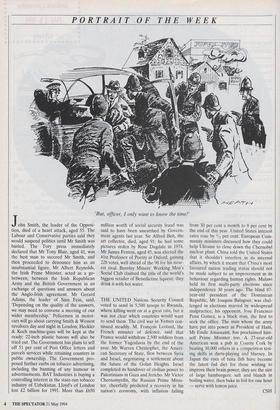PORTRAIT OF THE WEEK
'But, officer, I only want to know the time!' John Smith, the leader of the Opposi- tion, died of a heart attack, aged 55. The Labour and Conservative parties said they would suspend politics until Mr Smith was buried. The Tory press immediately declared that Mr Tony Blair, aged 41, was the best man to succeed Mr Smith, and then proceeded to denounce him as an insubstantial figure. Mr Albert Reynolds, the Irish Prime Minister, acted as a go- between, between the Irish Republican Army and the British Government in an exchange of questions and answers about the Anglo-Irish agreement. Mr Gerard Adams, the leader of Sinn Fein, said, 'Depending on the quality of the answers, we may need to convene a meeting of our wider membership.' Policemen in motor- cars will go about carrying Smith & Wesson revolvers day and night in London; Heckler & Koch machine-guns will be kept at the ready; 22-inch plastic batons will also be tried out. The Government has plans to sell off 51 per cent of Post Office letters and parcels services while retaining counters in public ownership. The Government pro- posed further curbs on tobacco advertising, including the banning of any humour in advertisements. BAT Industries is buying a controlling interest in the state-run tobacco industry of Uzbekistan. Lloyd's of London lost /2 billion for 1991. More than £650 million worth of social security fraud was said to have been unearthed by Govern- ment agents last year. Sir Alfred Beit, the art collector, died, aged 91; he had some pictures stolen by Rose Dugdale in 1974. Mr James Fenton, aged 45, was elected the 41st Professor of Poetry at Oxford, gaining 228 votes, well ahead of the 98 for his near- est rival. Burnley Miners' Working Men's Social Club claimed the title of the world's biggest retailer of Benedictine liqueur; they drink it with hot water.
THE UNITED Nations Security Council voted to send in 5,500 troops to Rwanda, where killing went on at a great rate, but it was not clear which countries would want to send them. The civil war in Yemen con- tinued steadily. M. Francois Leotard, the French minister of defence, said that France would withdraw 2,500 soldiers from the former Yugoslavia by the end of the year. Mr Warren Christopher, the Ameri- can Secretary of State, flew between Syria and Israel, negotiating a settlement about the future of the Golan Heights. Israel completed its handover of civilian power to Palestinians in Gaza and Jericho. Mr Victor Chernomyrdin, the Russian Prime Minis- ter, cheerfully predicted a recovery in his nation's economy, with inflation falling from 30 per cent a month to 8 per cent by the end of this year. United States interest rates rose by 1/2 per cent. European Com- munity ministers discussed how they could help Ukraine to close down the Chernobyl nuclear plant. China told the United States that it shouldn't interfere in its internal affairs, by which it meant that China's most favoured nation trading status should not be made subject to an improvement in its behaviour regarding human rights. Malawi held its first multi-party elections since independence 30 years ago. The blind 87- year-old president of the Dominican Republic, Mr Joaquin Balaguer, was chal- lenged in elections marred by widespread malpractice; his opponent, Jose Francisco Pena Gomez, is a black man, the first to seek the office. The man whom the army have put into power as President of Haiti, Mr Emile Jonassaint, has proclaimed him- self Prime Minister too. A 27-year-old American won a pub in County Cork by beating 30,000 others in a competition test- ing skills in darts-playing and blarney. In Japan the eyes of tuna fish have become the latest fad diet for those wishing to improve their brain power; they are the size of large hamburgers: salt and blanch in boiling water, then bake in foil for one hour — serve with lemon juice.
CSH




































































 Previous page
Previous page